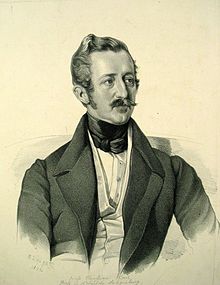Ernst I. zu Hohenlohe-Langenburg
Ernst I. Prince of Hohenlohe-Langenburg (* May 7, 1794 in Langenburg ; † April 12, 1860 in Baden-Baden ) was the 4th Prince of the House of Hohenlohe-Langenburg .
biography
Ernst Christian Karl was the eldest son of Prince Carl Ludwig zu Hohenlohe-Langenburg and his wife, Countess Amalie Henriette zu Solms-Baruth (1768–1847).
After studying for three years at the Universities of Tübingen and Heidelberg , he entered the Württemberg military service. In 1819 he became a member of the Württemberg Assembly of Estates and in 1833 President of the Committee of Estates, and in 1835 President of the Chamber of Class Lords (First Chamber) of the Württemberg State Parliament. This honorable position made him one of the most influential men in Württemberg . In 1848 he was a member of the preliminary parliament .
In 1830 Ernst zu Hohenlohe-Langenburg was awarded the Grand Cross of the Order of the Württemberg Crown .
Frequent illnesses gradually forced Ernst to withdraw from the active class business. In 1858 he asked for his discharge from the presidency. Prince Ernst died in 1860 while staying in Baden-Baden and was buried in Langenburg .
Marriage and offspring
On 18 February 1828 he married in Kensington Palace Princess Feodora of Leiningen , only daughter of Prince Emich Carl of Leiningen and his second wife Princess Marie Louise Princess Victoria of Saxe-Coburg-Saalfeld , thus the older half-sister of the British Queen Victoria .
The marriage had the following six children:
- Karl Ludwig Wilhelm Leopold (1829–1907) ⚭ 1861 ( marriage to the left ) Marie Grathwohl (1837–1901), Baroness von Bronn (1890)
- Elise Adelheid Victorie (1830–1850), unmarried
- Hermann Ernst Franz Bernhard (1832–1913) ⚭ 1862 Princess Leopoldine of Baden (1837–1903)
- Viktor Ferdinand Franz (1833–1891) ⚭ 1861 ( marriage to the left ) Lady Laura Wilhelmina Seymour, Countess Gleichen (1861)
- Adelheid Victoria Amalie Louise Maria Konstanze (1835–1900) ⚭ 1856 Duke Friedrich VIII of Schleswig-Holstein
- Feodora Victoria Adelheid (1839–1872) ⚭ 1858 Duke Georg II of Saxony-Meiningen (1826–1914)
Individual evidence
- ↑ Federal Archives: Members of the Pre-Parliament and the Fifties Committee (PDF file; 79 kB)
- ↑ Royal Württemberg Court and State Handbook 1858, p. 32.
Web links
| predecessor | Office | successor |
|---|---|---|
| Carl Ludwig |
Head of the House of Hohenlohe-Langenburg 1825–1860 |
Karl |
| personal data | |
|---|---|
| SURNAME | Hohenlohe-Langenburg, Ernst I. to |
| ALTERNATIVE NAMES | Hohenlohe-Langenburg, Ernst I. Prince to |
| BRIEF DESCRIPTION | Prince of Hohenlohe-Langenburg |
| DATE OF BIRTH | May 7, 1794 |
| PLACE OF BIRTH | Langenburg |
| DATE OF DEATH | April 12, 1860 |
| Place of death | Baden-Baden |
